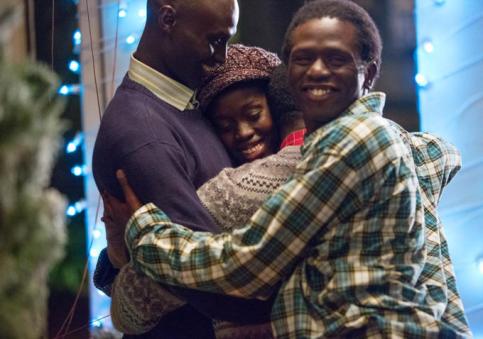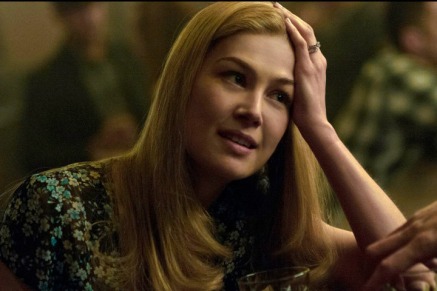Fellow cinephiles,
Big weekend in the world of film! If your MO is to see movies on their second or third week of release, have I got some recommendations for you.

You would not BELIEVE how long it took me to find a picture from The Good Lie that didn’t have Reese Witherwpoon in it… (Image c/o Indiewire)
On Thursday, A and I attended a pre-screening of The Good Lie, sponsored by Oxfam, Sudan Sunrise, Enough, and Sojourners. The film’s poster features Reese Witherspoon’s giant floating head over a scene of three young Africans walking across the desert, and already we have a hint that Witherspoon will be doing her best Sandra Bullock a la The Blind Side. Indeed, Witherspoon’s character Carrie Davis approaches Bullock’s tough-talking, no-nonsense mother figure as she takes on the responsibility of helping Sudanese refugees adjust to their new home in the United States.
The movie falls into three main parts, all extremely different tonally. The first act is heavy and devastating: several young children in Sudan are orphaned and displaced by a civil war. They must walk for hundreds of miles to safety and not all of them will make it. They finally find themselves in a refugee camp, where they are safe but still destitute. In the second act, several of these refugees are given the opportunity to move to the United States and begin a new life, as long as they get jobs within a few months and eventually pay the U.S. government back for their plane tickets. This act plays on the culture clash with some light humor; the refugees believe the telephone to be an alarm system, misunderstand American idioms, and slowly learn social graces. The third act is the most complicated, where the refugees find themselves facing moral quandaries and navigating legal missteps that threaten their residency in the U.S.
Through the second and third acts, Witherspoon appears as a guide and caretaker for these adults, with her own story arc of maturation. Often films of social importance can seem trite or overly inspirational; The Good Lie strikes a balance between treacly and sober (even if it does employ the “middle class white person tries to teach the less fortunate, but finds that the less fortunate teach her right back” trope).
I have been waiting for Gone Girl for what seems like an eternity. Director David Fincher has cultivated an interesting, iconic voice when it comes to thrillers. His earlier work, like Se7en, is a little less understated, but eerie nonetheless. Never was Fincher better than when he applied that sense of underlying uneasiness to The Social Network a movie about a bunch of guys creating Facebook (or, a previously underestimated and unconsidered subset of the population completely turning human interaction on its head from a technical standpoint, while struggling as a generation to participate themselves). It was a biopic with a perspective, and it soared.
But I digress. When Nick Dunne’s (Ben Affleck) wife Amy (Rosamund Pike) goes missing, he is the prime suspect for her kidnapping and possible murder, and the audience goes back and forth on whether or not he committed the crime. Amy pops up, reading her diary, to tell her side of the story in flashback. That’s the basic plot, anyway. But it’s really a movie about marriage, or perhaps just one marriage in particular, one that most would consider an unhealthy marriage. A marriage where both parties are involved in a cat-and-mouse game of equal parts outfoxing, entrapment, and codependence. On top of this, there are moments of genius: a beautiful blood splatter, a smartly framed long shot of a house, a look on Amy’s face. Pretty much every look on Amy’s face is bordering on genius.
Gone Girl’s tone is in the same vein as The Girl with the Dragon Tattoo, another Fincher film. Both are straightforward mysteries, developed from pulpy novels sold in airports, each with a beast of a twist partway through. Both are very good. Gone Girl toes the line of greatness with some smart, Social Network-esque subtleties.
Sadly, due to the aforementioned twist, I can’t say much more. I recommend Gone Girl, but if you are easily upset by blood or general twistedness, prepare yourself… The level of disturbing content is more or less on par with Fincher’s other thrillers, and the ratio of vague creepiness to truly upsetting images is roughly the same as Prisoners (similar tone, themes, and cinematography… though Prisoners is better. You should watch Prisoners. But not as a double feature with Gone Girl.).
Friend reviews: I saw Gone Girl with H and J, who both liked it, and Mama Reel Insight recommends it with reservations for squeamish people.

